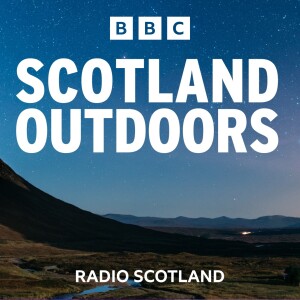
Paper Boats, Shakespeare in Scotland and The Huntly Toads
 2023-11-18
2023-11-18
Download
Right click and do "save link as"
Rachel tries her hand at angling with the Dee Damsels. The group was set up by Tara Spiers to support women who were keen to learn more about fly fishing.
Mark returns to the Greenmyres Eco Bothy run by the Huntly Development Trust. He gets an update on the work they’ve done on the site so far including walking and cycling trails plus hears about their plans for the future.
Stretching nearly 80 miles from Fort William to Inverness, the Great Glen Way is one of Scotland’s most popular walking routes. However, part of the route is currently closed due to forestry operations as producer Phil Sime found out.
We chat live to forecaster Judith Ralston about a new BBC Scotland documentary- Scotland's Weather- Our Changing Seasons.
Poaching is seen by some as a victimless crime but as Rachel finds out, that is far from the case. She meets Police Wildlife Crime Liaison Officer for the North East, Hannah Corbett who explains the issues caused by poachers. And she also chats to two of the people who look after the River Findhorn, known as Bailiffs, about the type of people they catch poaching and the impact it can have on fish stocks.
Helen Needham meets up with one of the Paperboats collective, Environmental Scientist and writer Sandy Winterbottom. The group are made up of Scotland based writers, artists and activists focussed on nature and environment and they are preparing to campaign outside the Scottish Parliament with a flotilla of paperboats.
Mark is in Birnam as the 400th anniversary of Shakespeare’s first folio is celebrated. He chats to Dr Toria Johnson from Birmingham University about the true connections between Macbeth and the Birnam Oak.
And Mark visits a community garden in Huntly where Deveron Projects have brought together artist Susie Dalton and the Huntly TOADS outdoor education group to build a shelter for the garden.
view more
More Episodes
Insects, Seaplanes and Chickens
 2021-06-26
2021-06-26
 2021-06-26
2021-06-26
Squirrels, Trees and Swallows
 2021-06-05
2021-06-05
 2021-06-05
2021-06-05
In Search of the Source of the River Dee
 2021-05-12
2021-05-12
 2021-05-12
2021-05-12
The Dawn Chorus from North East Scotland
 2021-05-05
2021-05-05
 2021-05-05
2021-05-05
012345678910111213141516171819
Create your
podcast in
minutes
- Full-featured podcast site
- Unlimited storage and bandwidth
- Comprehensive podcast stats
- Distribute to Apple Podcasts, Spotify, and more
- Make money with your podcast
It is Free
- Privacy Policy
- Cookie Policy
- Terms of Use
- Consent Preferences
- Copyright © 2015-2024 Podbean.com


